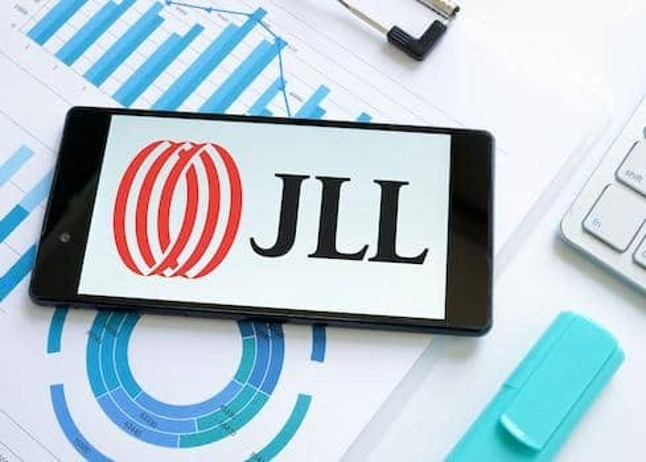Fortune 500 real estate giant JLL CIO Eddy Wagoner says that the office experience is space plus technology. Here's why the company has acquired an AI startup and launched a tech-focused venture capital fund.

At Fortune 500 real estate giant JLL headquarters, there’s a two-story gathering place that looks like a night club. It includes a barista bar and is called “The Point.” Even though JLL employees are spread out over six or seven floors in that building, they gravitate to The Point because they are more likely to just bump into coworkers they wouldn’t ordinarily see.
That’s led to more collaboration, according to JLL Digital CIO Eddy Wagoner. Indeed, some of the company’s clients prefer to meet at this JLL building rather than go out to, say, a dinner meeting, he said.
“It’s not your typical conference room,” Wagoner told InformationWeek. “Conversation flows more naturally here. That was where we realized that this idea of ‘experience’ was a combination of the physical space coupled with the way that we leverage technology.”
That experience -- physical space plus technology -- has shaped JLL’s strategy and approach in recent years, starting well before the COVID-19 pandemic hit. But the changes JLL made have paved the way for a new kind of office operations that is better suited for pandemic conditions and post-pandemic changes.
In JLL’s case, technology could mean a newer type of conference room where remote participants aren’t just a voice coming out of the ceiling -- they have some kind of “presence.” Technology means IoT devices monitor functions for the facilities group, such as temperature and air exchange rates. Technology also means being able to book a desk if you are visiting the office for the day, and you can coordinate to sit next to a coworker who is also visiting that same office.
Offices typically offer multiple services, Wagoner explains. For instance, someone puts the paper in the printers. Someone helps employees with laptop problems. Someone runs the on-site cafeteria. Someone maintains the temperature and air quality of the office. As an employee, if there’s an issue, you need to go to a different group for each one of these different issues. However, JLL’s vision is to remove that friction and collect all those services into a single interface experience app for employees.
“With the experience app, we eliminate you having to know that you need to go to office services for one thing and then remember the URL for the IT help desk for another thing,” Wagoner says. “We don’t even necessarily replace any of the existing technology. We just give the end user a much better, easier experience to get to what they need.”
This experience app is called “Jet,” and it also can inform workers of rules for particular buildings during the pandemic. For instance, if you book a desk in a building or as you approach a building it might tell you if that building has a vaccine requirement or a masking requirement.

Eddy Wagoner, JLL Digital
“We decided to completely reinvent technology at JLL,” says Wagoner, explaining that this reinvention goes beyond the typical IT systems that every company has and the typical systems that the company has traditionally provided to its clients.
“We created the capability to actually build revenue-producing technology products, like our experience app, and our real estate business intelligence application,” Wagoner says.
JLL invested in offering technology services to clients in a SaaS model and a consulting model under the business division and brand JLL Technologies (JLLT). Established in 2019, this group currently counts over 2,000 organizations as customers, including 86 of the Fortune 100. For instance, the organization’s integrated services and technology platform can help clients manage their space more efficiently. Some clients only use the SaaS services even if they don't use the company's other services, Wagoner said.
One of the capabilities that JLL has added came through the acquisition of Corrigo, a cloud-based facilities management solution provider and work order platform.
More recently, JLL has acquired Skyline AI, an artificial intelligence startup. This company will come under the JLLT division providing technology to help clients with their real estate investments and portfolio management. JLL says that the software will help clients predict future property values, improve cost savings, and identify investment opportunities.
The acquisition builds on the JLL Spark global venture fund, launched in 2018 to fuel and accelerate innovation in property technology by investing in early to mid-stage property technology startups, according to JLL. One such portfolio investment is in Turntide Technologies, a company that offers machine learning-integrated motors -- powering fans, air conditioners, and elevators, for instance -- that are used to reduce buildings’ carbon footprints and energy consumption. JLL reports that Turntide’s Smart Motor System has reduced energy consumption in JLL buildings by nearly 64%.
Integrating technology into the function and facilities of buildings is part of the strategy. At surgical facilities, operating rooms are kept at higher pressure levels than other rooms to push pathogens out of the sterile space. Historically, the room pressure is checked once a day. But those rooms can be equipped with IoT devices that monitor them 24/7, says Wagoner. That means if your surgery is scheduled for the afternoon and the pressurization fails at 1 pm, the monitoring system can send an alert -- something that would have been missed in the old once-a-day manual check.
JLL can also collect the data from IoT devices and systems throughout its buildings and facilities to fuel analytics and machine learning efforts that will help enhance future operations.
Office of the Future
JLL has been building the office of the future even as the pandemic continues. Some employees may be returning to the office full time while others are planning to return on a hybrid basis. While some may revisit their return in the wake of another wave of COVID and the Delta variant, JLL is making sure that its office experience technology incorporates the services that businesses need now and when employees return.
For instance, after a desk or conference room has been used by an individual or team, perhaps the technology platform will automatically dispatch the enhanced cleaning team to the location to make it ready for the next time it is needed, Wagoner says.
JLL launched the Experience / Anywhere program in April 2021 to support the emerging hybrid work experience. It is comprised of the Program Management Office to help management plan their strategies and provisioning policies and The Hub, offering employees a digital portal and marketplace focused on wellbeing resources and practical conveniences. For instance, employees can procure home office furniture, do an ergonomic assessment, and learn how to enhance their physical well-being and productivity.
“It’s not just technology for technology’s sake,” Wagoner says. “It’s actually revolutionizing the business process through technology and through the data that we generate.”
What to Read Next:
Lessons in Becoming Data Driven
10 Cloud Strategies to Avoid Cost Overruns
About the Author(s)
You May Also Like







